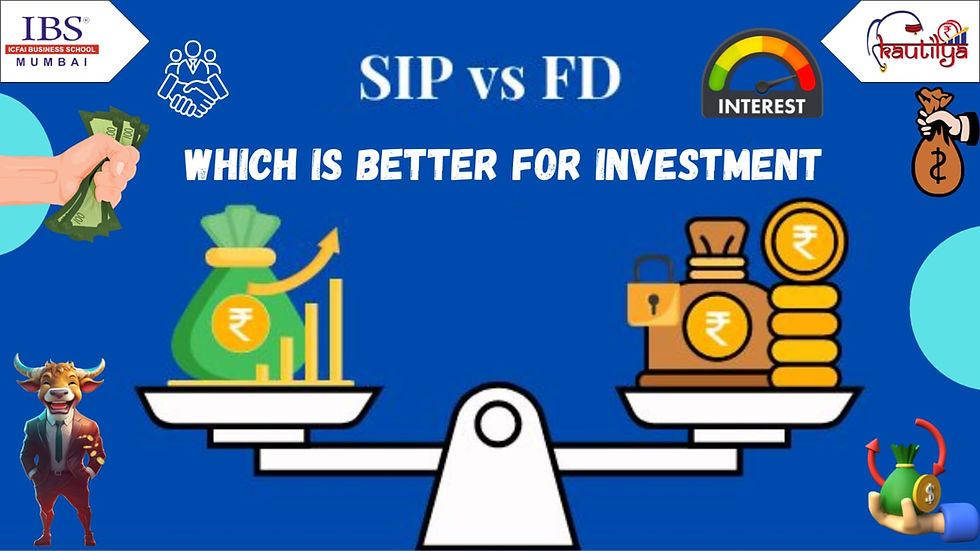SIPs vs FDs - Which makes more sense today?
- Team Kautilya

- Aug 27, 2025
- 3 min read
SYNOPSIS
Comparing Fixed Deposit (FDs) and Systematic Investment Plan (SIPs) aims to evaluate which makes more sense in today’s era. While FDs shine in principal safety, SIPs offer market-linked returns, combining both is seen as the best path for astute investors in 2025.

It’s no secret that Investment means putting money into assets that generates returns and enables investors gain financial independence. But knowing where, when and how much to invest is more important. For decades Fixed Deposits were a go to choice for investors in India as they guaranteed around (8% - 10%) returns with less risk and was a simple investment product. But in the recent years, there has been a sudden shift of investors moving their money from FDs to SIPs. Why is this happening? Which investment is making more sense in today’s contemporary world?
Fixed Deposit (FD) - Is an investment where a lumpsum amount is invested by an individual for a specific period of time in a bank at a pre-agreed interest rate. FD gave benefits of assured returns, zero risk, ease of investment, safety and stability. It was popular and safest investment option, especially in the earlier days.
Systematic Investment Plan (SIP) is a type of investment in which an individual can invest a certain amount at regular intervals like monthly, weekly, quarterly basis in Mutual Funds. SIPs work like recurring deposit and are flexible, means that they can change the investment amount according to your financial circumstances. SIPs deliver gains in disciplined investment, cost efficiency, flexibility and diversification.
Economic Impact for Americans
Higher debt levels can affect mortgage and credit card interest and the stability of the U.S. dollar. And Tariffs can increase the price of products like from smartphones to home appliances.
So which investment option really makes more sense in today's era?
1. Returns –
SIPs invest in mutual funds therefore are market linked and it’s performance depends on market cycle and the type of fund invested in. If the market is high, then the returns generated will also be high generating more returns than a fixed deposit and enabling investors to outperform inflation.
Whereas, FD assures guaranteed returns at fixed interest rates, making them a safer option. But it is yielding lower due to the current fluctuating FD rates (2.50% to 7.50%) making it less competitive.
2. Risk –
SIP returns fluctuate based on market performance, the risk is also volatile mainly due to market risk. However, FD carry negligible risk and ideal for capital preservation.
3. Flexibility –
SIP let you start with small amount and adjust, pause or stop anytime without penalties. Considering this flexibility, it makes it more valuable as mutual funds are showing better average returns allowing investors to switch between funds or rebalance their portfolio. while FDs demand a lump sum and lock-in. Early exit is permitted, but earns lower interest.
Conclusion
While both have their uses within a portfolio, they serve different purposes. FD plays a role in short term safety while SIP provide flexibility and potential growth. A strategic investor in 2025 would have both FDs to serve as a safety net and SIPs to function as a growth engine and ensure long-term growth of wealth.
.png)



Well written!